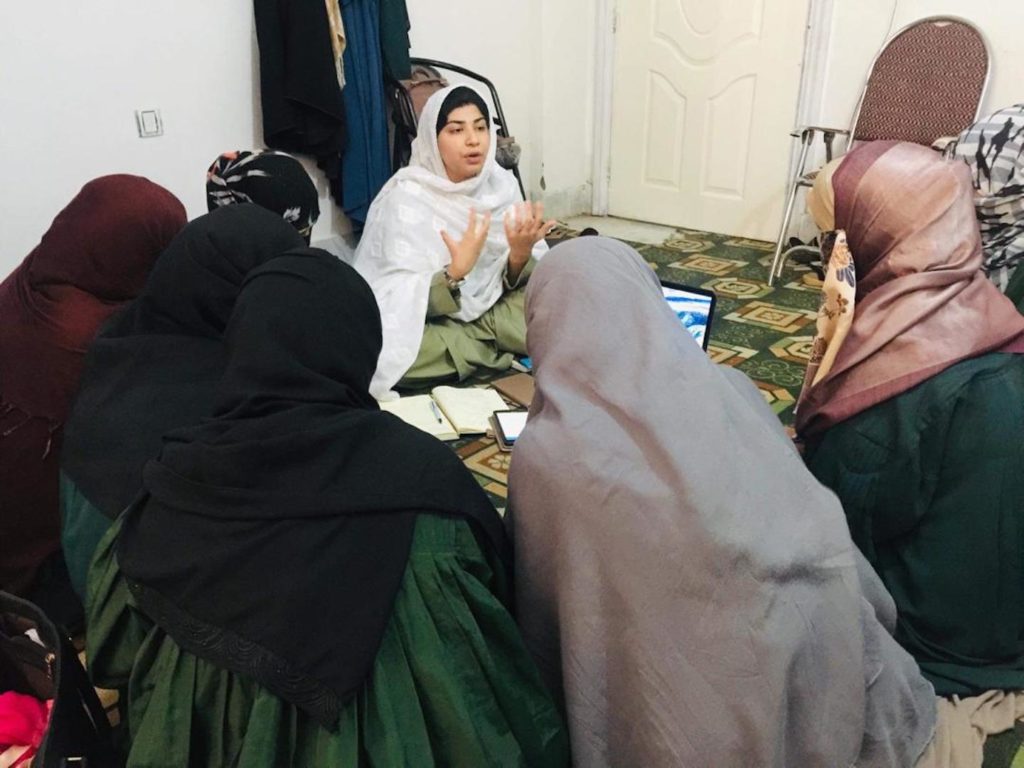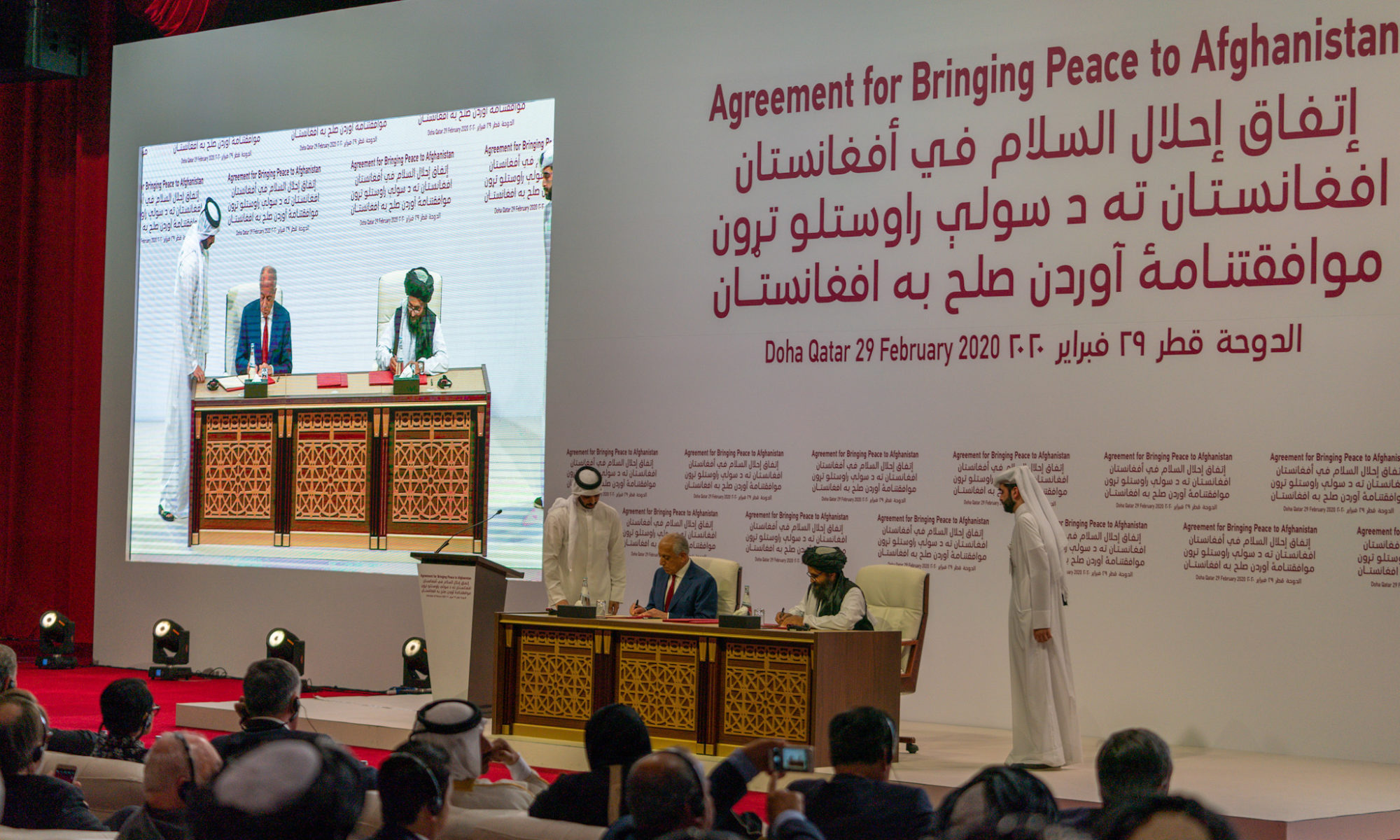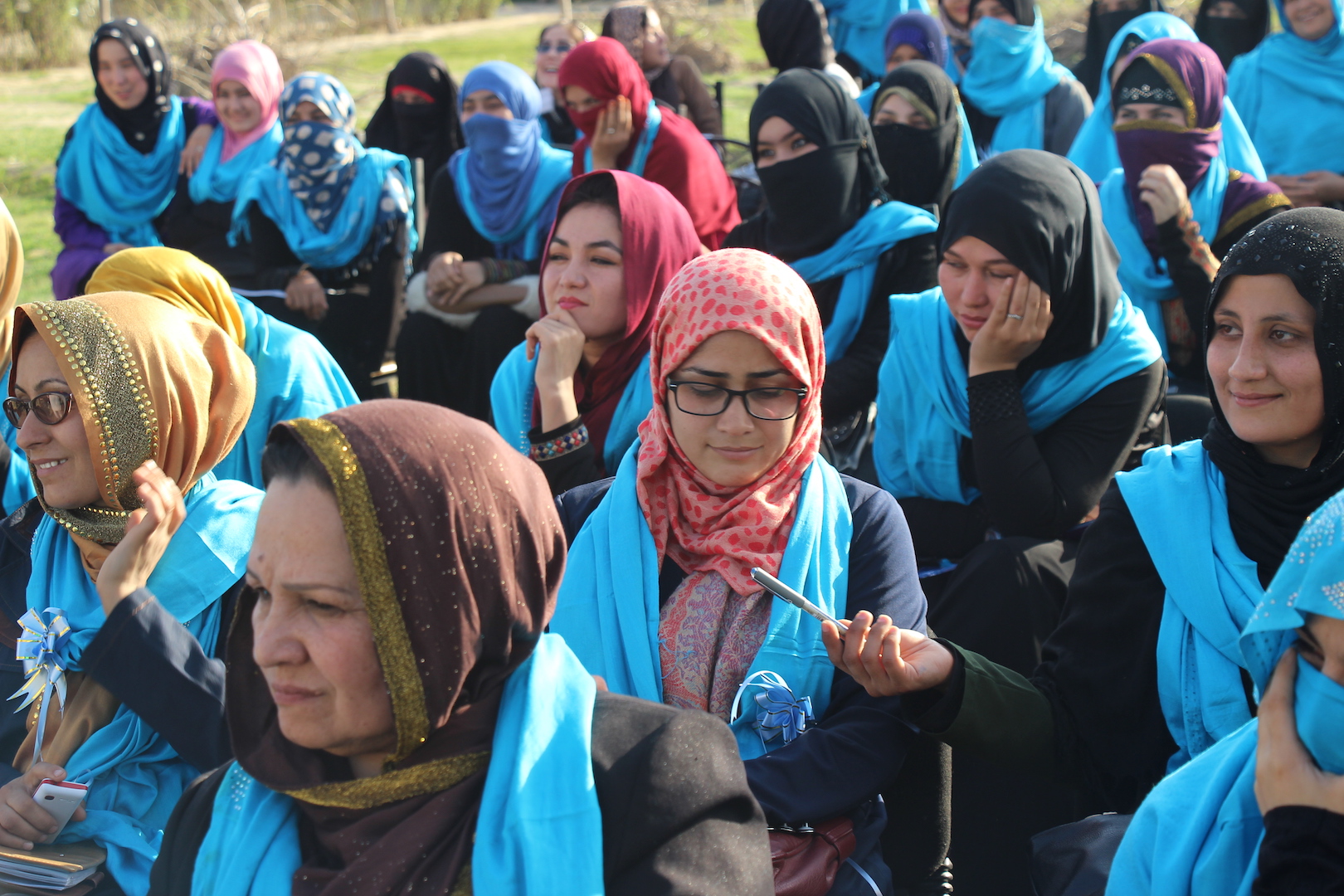![]() Cover Photo: Women are celebrating the 8 of March in 2017 in the city of Kunduz, just a few kilometers away from Taliban’s frontline. [Photo By Qais Azimy]
Cover Photo: Women are celebrating the 8 of March in 2017 in the city of Kunduz, just a few kilometers away from Taliban’s frontline. [Photo By Qais Azimy]
After much anticipation, the United States and the Taliban signed a preliminary peace agreement on 29 February 2020 in Doha, Qatar. The deal has four main points: 1) A 14-month timeline for the withdrawal of U.S. and other foreign troops from Afghanistan; 2) A Taliban guarantee that Afghan soil will not be used against the U.S. by any foreign or Afghan armed groups that would threaten the security of the U.S. and its allies; 3) A commitment from the U.S. to lift sanctions against the Taliban and work with the United Nations to lift its sanctions against the Taliban; 4) A commitment from the Taliban to have intra-Afghan negotiations after a prisoner swap of 5,000 Taliban prisoners in return for 1,000 Afghan security forces’ prisoners.
Some believe this could take Afghanistan to lasting peace after 19 years of bloodshed, and it will end the war. But there is no doubt that a hard, long road lies ahead.
Pashtana Durrani, 22, doesn’t remember a day of peace. Durrani sees herself a survivor of the war, and now a warrior in the battle for equality. When she reads the peace agreement, she thinks American negotiators have traded women’s rights for a political settlement. She is upset that women’s rights are largely ignored in the agreement and worries about her future in her country. Durrani believes women in Afghanistan have changed and she is confident the newly-educated generation will earn their rights: “Women wouldn’t be silent this time, women will fight back, so I believe in the women’s power, not the government or the Taliban.”
Durrani was born a refugee in Pakistan in 1998. She was three years old when the Taliban regime collapsed in Afghanistan and her family returned home when she was 19. All she remembers is that her father used to tell her that their family had left Afghanistan because it was not safe to live under the Taliban. Durrani started five digital schools in 2019 which now teach around 900 students in Afghanistan. She is one of the country’s best-known female human-rights activists.

Durrani knows better than many the need for the peace and the dark side of the endless war. “Our community lost around 1,700 people to the Taliban, about two weeks ago I lost a cousin, but I’m honest, I cannot meet more widows, I cannot talk to more orphans, I just want them to go to school and have peace,” she says.
Durrani’s parents are from Kandahar, a southern Afghan province where the Canadian army were based from 2006 to 2011. Canada lost 158 soldiers in Afghanistan, and more than 1,800 Canadians were wounded. The war cost Canada at least C$18 billion. This was all done in the name of democracy and women’s rights. Canada still has many aid projects in Afghanistan. Kandahar is also known as the birthplace of the Taliban movement in 1994 and its power base to this day. Historically, it was one of the most culturally significant cities of the Pashtuns, the biggest ethnic group in Afghanistan.
Durrani is tired of war but she doubts the Taliban could bring her the peace that she wants; for her, “peace is freedom” and there is no way to go back to the life of women before 2001. When the Taliban were in power – from 1996 to 2001 – women were prevented from attending school entirely. Women were banned from leaving the house without being accompanied by a close male relative such as a father, brother, or husband. They were denied health care delivered by men; with women forbidden from study, health care was virtually inaccessible. Women were not allowed to enter politics or speak publicly. Listening to music or watching T.V. was prohibited, not only for women but for men, too.
Restrictions on women went even further. They were banned from exposing their skin in public, even their faces. Anyone who would dare to break this rule would be publicly whipped. It became criminal for women to venture on to their private balconies. Some residents of Kabul were forced to paint their windows so that women inside the home would not be seen. Restrictions on freedom of expression also applied to men. Males were ordered to wear Islamic clothes and a cap. Men were not allowed to shave or trim their beards, and they also had to attend prayers in mosques. It was an oppressive time for women especially, but this affected society as a whole.
Over the last hundred years, Afghan rulers have tried to reform the constitution and laws to give women more rights and freedoms. This has been met with resistance between the urban and rural classes; reforms have often been viewed as a minority urban practice imposed on a majority rural population where it has always been predominantly male-controlled.
At various moments in Afghanistan’s history, the misuse of religion has been a major impediment to women’s freedom of expression. This reversal has been felt especially strongly in Afghanistan because of its unique interpretation in the land; many even argue that the rights that Islam has given to females are held back from Afghan women. Any moves to strengthen the feminist movement wither because of contradictions between religion and custom.
It has long been this way. In 1919, King Amanullah Khan tried to enhance the notion of freedom by introducing the ideology of Islamic modernism to Afghan society which contained aspects of the Western lifestyle. Khan’s liberal movements angered religious circles and the country witnessed a series of violent uprisings by many tribes and religious clerics who deemed modernization to be “un-Islamic.”
King Amanullah Khan’s wife, Queen Soraya Tarzi, was born in Syria into a well-known Afghan family. She was educated by her father, Sardar Mahmud Beg Tarzi, who was an Afghan leader and intellectual. Queen Soraya for the first time encouraged Afghan women to get an education and opened the first school for girls in Kabul. Along with her mother, she founded the country’s first women’s magazine in 1927, called Ershad-I-Niswan, (Guidance for Women).In 2020, Timemagazine called Queen Soraya Tarzi one of the 100 most influential women of the past century in the world. The Queen was known throughout the world for her progressive ideas, including in Afghanistan.
Soraya was also the first Afghan woman to speak publicly about women’s rights, and was the first woman to take the bold step of appearing in public without the veil or the hijab. This was all part of King Amanullah Khan’s modernism, but religious clerics protested the king’s reforms and started an uprising against him that led to violence. Unfortunately for them, King Amanullah and his queen were forced to leave the country; his rule came to an end in 1929 and the short gains of Afghan women were abruptly erased. Today, once again, there is fear of history being repeated and Afghanistan being abandoned again, especially for Afghan women.
Zabiullah Mujahid, the Taliban’s chief spokesman, said in a telephone interview that Afghan women should not be concerned “because we are not bringing anything new or a man-made law – we will give them the rights that Islam has given them.” He insisted that women under the Taliban government would be allowed to get education on the subjects that Islam permits them, but under the condition that “women should study and work in separate buildings from the men. Women should have their exclusive transportation arrangements.”
The Taliban are hoping to re-establish an Islamic Emirate in Afghanistan (an Islamic state based on Sharia law) after the U.S leaves. For Mujahid, having a government based on Sharia law is what they have been fighting for over the past two decades and they will not compromise on that. “Every citizen, men and women, will be given the rights based on Sharia law. Our people are Muslim and they would be pleased with the rights that Islam has given them,” said Mujahid.
That is exactly what worries Shahrazad Akbar, head of Afghanistan’s Independent Human Rights Commission, who says that Taliban believe “their interpretation of Islam is the only right interpretation, and everyone should obey that.” Akbar was one the first women who met with the Taliban for the peace talks in July 2019 in Doha, Qatar. Akbar was working in the Afghan Government, but she had to participate in a “personal capacity” in order to circumvent the Taliban’s rejection, because the Taliban had refused to talk to the Afghan government, calling it a “puppet regime” of the U.S.
In the opening statement of that meeting, the Taliban offered some assurances on women’s rights. But that did not satisfy Akbar, who called them “very vague. As a human rights activist, that is very concerning to me.” According to Akbar, the Taliban were talking about human rights and women’s rights within the Islamic framework, without specific detail of their current position on those important aspects that many Afghans are concerned about. They did not even give an example of how they will treat women if they run the government again. “Different Islamic countries have different ways of dealing with women’s Islamic rights. So where do they [Taliban] exactly stand? Is that the Saudi Arabian model? Is that the Iranian model? Is it the Indonesian model? What is it closest to? They weren’t very specific,” said Akbar.
For Akbar, women could be the most vulnerable group and the first victims of these peace talks, because she does not believe that the Taliban have changed from the past: “The fact is that they [Taliban] genuinely in their worldview think that woman are secondary citizens, women are secondary people, women are less human than men. Not only they think that way, they are proud they think that way, and they think that’s the only right way to think because they think that’s what the religion says, that women have less dignity than men,” said Akbar.

Afghan women officially gained equal status under the 1964 constitution, which declared that women, “without discrimination or preference, have equal rights and obligations before the law.” Among other things, this constitution guaranteed women “dignity, compulsory education and freedom to work.” The constitution also gave women the right to vote and allowed them to enter politics.
Under King Zahir Shah, during the “Decade of Democracy” between 1963 and 1973, many progressive reforms were introduced, which had a great impact on the life and role of women in Afghan society. In this way, Afghan women were now granted entry into modern society. Men were also making way for them to take their rightful place in multifaceted activities. Anyone in society who protested was jailed and challenged to substantiate their objections by providing positive Quranic proof – that is, direct Quranic verses as opposed to personal interpretations of the religious document.
King Zahir Shah was removed from power in a bloodless coup by Daoud Khan, the ex-Prime Minister of Afghanistan (1953-1963), who was also born into the royal family. He overthrew the kingdom of his first cousin, Mohammed Zahir Shah, and declared himself the first president of Afghanistan in 1973 with Soviet backing.
Over the years, an increasing number of educated women entered the government and the private sector. New jobs were created for women as administrators, judges, doctors, even parliamentarians. Women were also employed in factories, including ceramics, pharmaceuticals and housing construction. The direction was positive and steady, even though the numbers were small relative to the total female population. Still, the society as a whole made space for women. Another pioneering effort was seen in the preamble of the new Constitution of the Republic of Afghanistan of 1977. Article 27 stated that “all the people of Afghanistan, both women and men, without discrimination and privilege, have equal rights and obligations before the law.”
Progress continued without further setbacks. As women became increasingly aware of the importance of their roles, they began to examine their opportunities as individuals rather than stereotypes or national symbols only in big cities. They fought to be released from the structures of family consensus and restrictions imposed by the family. This continues to be the dominant institution in Afghan society to this day.
Fawzia Koofi, a former Afghan Member of Parliament, was one of only two women at the Moscow peace talks with Taliban in May 2019 at President Hotel. The first thing that crossed her mind when she met the Taliban “was their brutality and their oppression of women in Afghanistan.” She observed that the Taliban faces reminded her of the regime when the Taliban were “beating up women, whipping women for not wearing the burqa in the streets of Kabul.” She said she had seen those scenes herself as a young girl living under the Taliban regime.
Koofi agrees that there was a lack of clarity in Taliban statements in the meetings. According to Koofi, the opening statement from the Taliban was 14 minutes long; it was mainly to give the Taliban’s perspective on women’s rights, but at the end Koofi did not know “what is actually their definition of Islamic education or Islamic social and political participation of woman?” The Taliban claim that they support women’s rights under the Islamic Sharia, but Koofi says women have experienced the Taliban’s type of women’s rights during Taliban rule of the country. Simply put, the Taliban are not offering anything new.
Akbar and Koofi, the two women who met the Taliban for peace talks, were trying to say that Afghanistan has changed. “The current Afghanistan with all the transformation in terms of media, social media, the younger educated generation – all of these indicate that the future government should be a political settlement based on the will of the people,” said Koofi. She added that for the new Afghanistan, another Taliban government (Islamic Emirate in Afghanistan) is out of the question.

